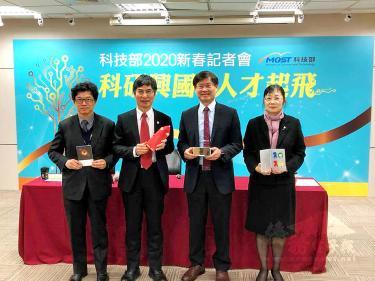
The Ministry of Science and Technology (MOST) plans to set up new semiconductor research centers to boost industrial applications of space technology, quantum computing and artificial intelligence (AI), Minister of Science and Technology Chen Liang-gee said yesterday.
Taiwan’s semiconductor industry last year generated revenues totaling NT$2.6 trillion (US$86.78 billion), and that figure is projected to reach NT$5.2 trillion or even NT$6 trillion in the next decade, he told a news conference in Taipei.
While Taiwan’s semiconductors are world-leading, talent cultivation in the sector should be improved, especially when the nation’s space technology, quantum computing, AI technology, smart medicine and machinery, and autonomous driving technology sectors all rely on better chips, he said.
After promoting the semiconductor “moonshot” program for nearly two years, the ministry is considering establishing new semiconductor research centers across the nation to create clusters of professionals, he said.
However, the government could do more to increase the basic research budget, Chen said.
In 2018, funding for basic research made up 7.3 percent of the nation’s total research and development funding (including that of companies), the lowest ratio since 2009 and lagging behind South Korea, Japan, the US and the Netherlands, ministry data showed.
While the ministry hopes to increase the basic research budget to NT$29.7 billion this year, up from the NT$25.7 billion approved by the legislature last year, it is unlikely to gain the legislature’s support, he said.
The government plans an average of NT$120 billion every year for technological research and development, with 30 to 35 percent going to basic research and nearly 65 percent to applications, he said.
By comparison, the research and development funding of private firms totals NT$450 billion every year, of which only a few percent is used to support academic research, he said, expressing hope that companies would devote more funding to academic research.
Over the past two years, Chen has traveled to several cities in the US and Europe to recruit young academics.
Ministry data yesterday showed that 27 academics previously studying overseas have been recruited by Taiwanese institutions.
A Japanese academic was recruited by a natural science department. The other 26 are Taiwanese, including seven who are joining natural science departments, 10 joining engineering departments, seven joining life sciences departments and two joining humanities departments, ministry data showed.
Chen said he plans to visit Houston, Boston, Chicago and Seattle in late March to recruit talent.
Describing himself as the longest-serving technology minister — Chen assumed office in February 2017 — and the first tech minister to have obtained his doctorate from a local university, Chen said he hopes his experience will encourage more young people to make breakthroughs.
Asked what his next move would be after the new Cabinet members are sworn in on May 20, Chen said that he would prioritize his academic research, especially in the semiconductor field.